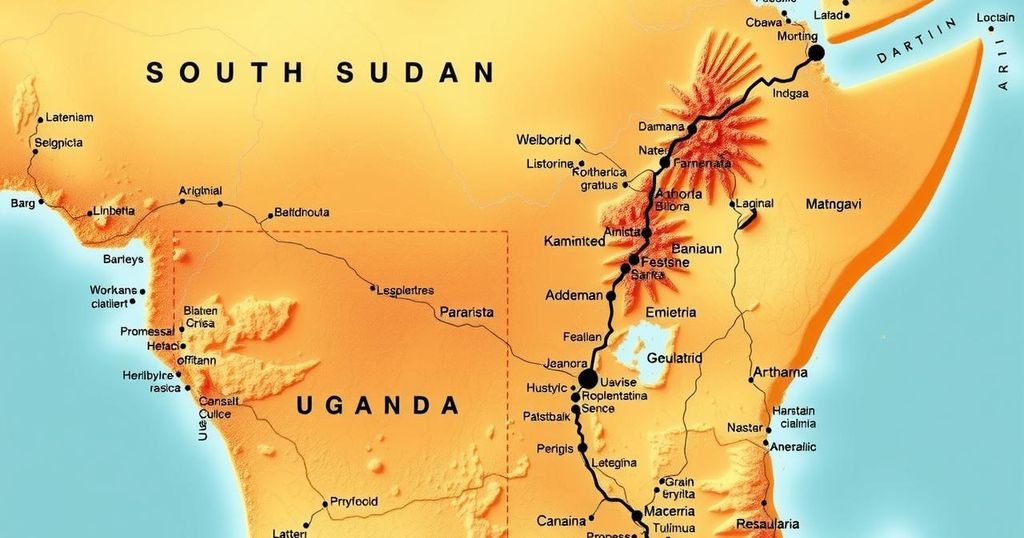Navigating the Complex Dynamics of South Sudan and Uganda’s Relation

South Sudan is at a critical juncture regarding its relationship with Uganda, characterized by historical support but also contentious military involvement. While Uganda has significantly aided South Sudan’s independence and ongoing trade, tensions from military interventions and regional power dynamics threaten stability. Developing a balanced foreign policy and strengthening ties with additional regional partners will be essential for South Sudan’s sovereignty and governance.
South Sudan, the world’s youngest nation, currently faces a significant challenge in its bilateral relationship with Uganda. This relationship, characterized by historical ties and competing political interests, has implications for both countries’ stability and economic progress. Uganda has historically supported South Sudan during its quest for independence, notably providing military assistance, but this support has evolved into a complex coexistence marked by both cooperation and tension.
Since gaining independence on July 9, 2011, South Sudan has relied on Uganda for various needs, including trade and labor. Uganda has also played a crucial role in facilitating peace initiatives through organizations such as the Intergovernmental Authority on Development (IGAD). Despite this partnership, Uganda’s military presence in South Sudan has sparked contention, particularly following the eruption of civil war in December 2013, leading to further instability and loss of lives.
The conflict led to heightened military tensions not only in South Sudan but also in its relations with Uganda. While the civil war officially ended with a peace agreement in 2018, the ongoing crisis continues to affect governance and humanitarian conditions in South Sudan, intertwining its fate with the geopolitical landscape of the region. Both nations’ involvement in neighboring countries has complicated their bilateral relations further, often infringing upon international humanitarian laws.
Uganda’s support for President Salva Kiir has fueled accusations of partisanship, creating deeper divisions within South Sudan. This alignment has also drawn Uganda into a wider regional power struggle, as various countries back different factions within South Sudan, further complicating the political scene. Moreover, the two neighbors are competing for economic influence, particularly concerning regional resources, trade routes, and energy supplies.
Uganda’s investment interests in South Sudan’s oil industry have raised international eyebrows due to ongoing instability and inadequate infrastructure. The relationship between the two nations is, therefore, crucial for ensuring mutual economic benefits while avoiding disputes exacerbated by competing interests.
Given its strategic location in the Horn of Africa, South Sudan attracts global attention from powers such as the United States, China, and Russia, anxious to access the region’s raw materials. Uganda’s stability and influence compel it to support South Sudan, but this has led to strained relations with regional neighbors like Sudan, complicating diplomatic dynamics.
Global entities such as the United Nations and the African Union have influenced Uganda’s actions, urging a balanced approach towards South Sudan. The international community seeks neutrality from Uganda as it supports dialogue among different factions within South Sudan.
To navigate its relations with Uganda, South Sudan must develop a nuanced diplomatic strategy. A balanced foreign policy is critical to protect its sovereignty while managing its economic dependencies. Diversifying partnerships with regional powers such as Ethiopia and Kenya could help establish a more equitable diplomatic framework, enhancing stability amid internal governance challenges.
Given the fragile governance system in South Sudan, the risk of excessive foreign influence persists. Only through inclusive governance and genuine peacebuilding efforts can South Sudan disengage from the complexities of external regional politics and secure its future.
In summary, South Sudan must strategically manage its relationship with Uganda amidst complex historical, political, and economic dynamics. The ongoing challenges stemming from military involvement and regional power struggles necessitate a comprehensive foreign policy focused on sovereignty and diversified partnerships. By prioritizing internal governance and engaging with various regional actors, South Sudan can better navigate external influences while fostering stability and progress for its diverse population.
Original Source: www.radiotamazuj.org








